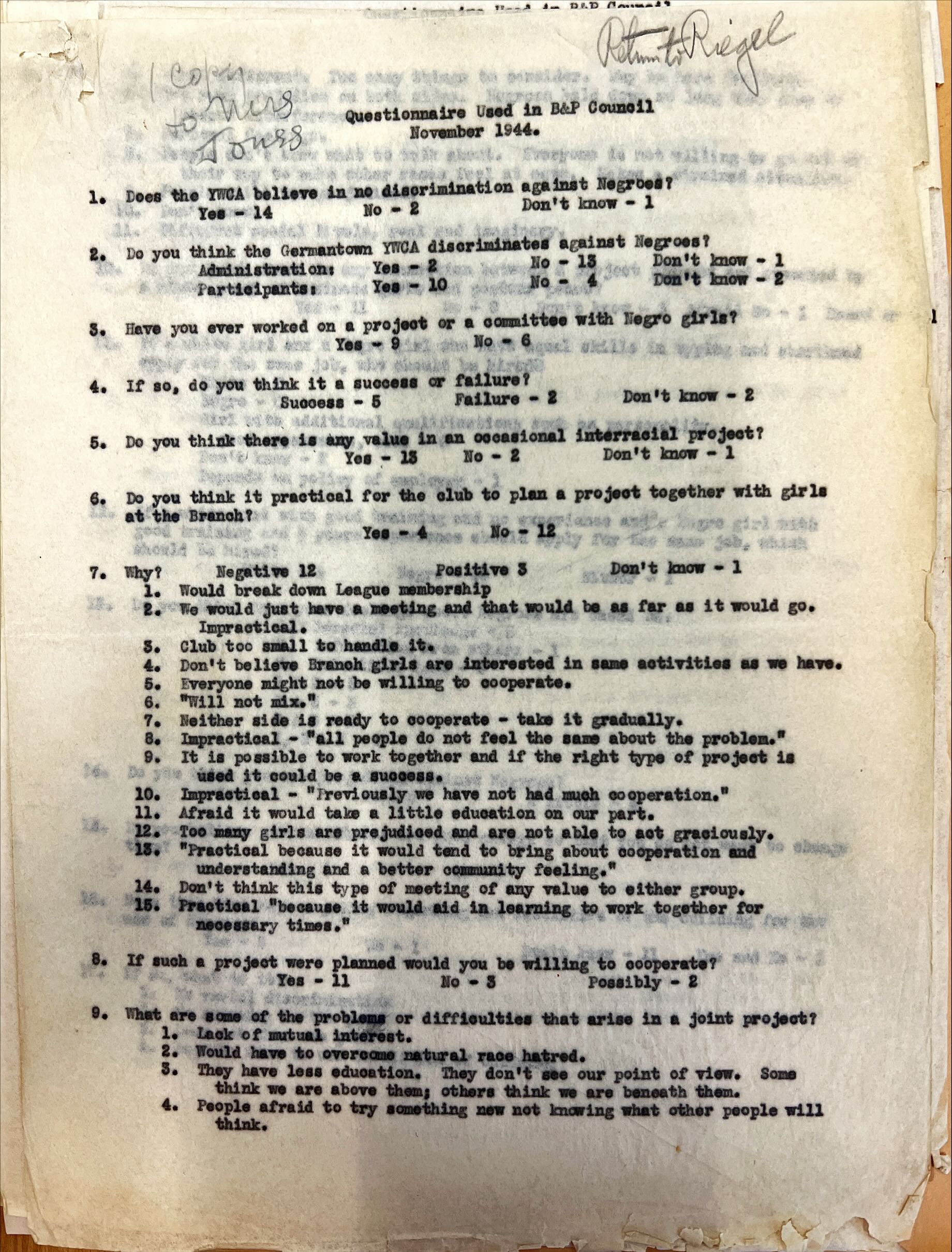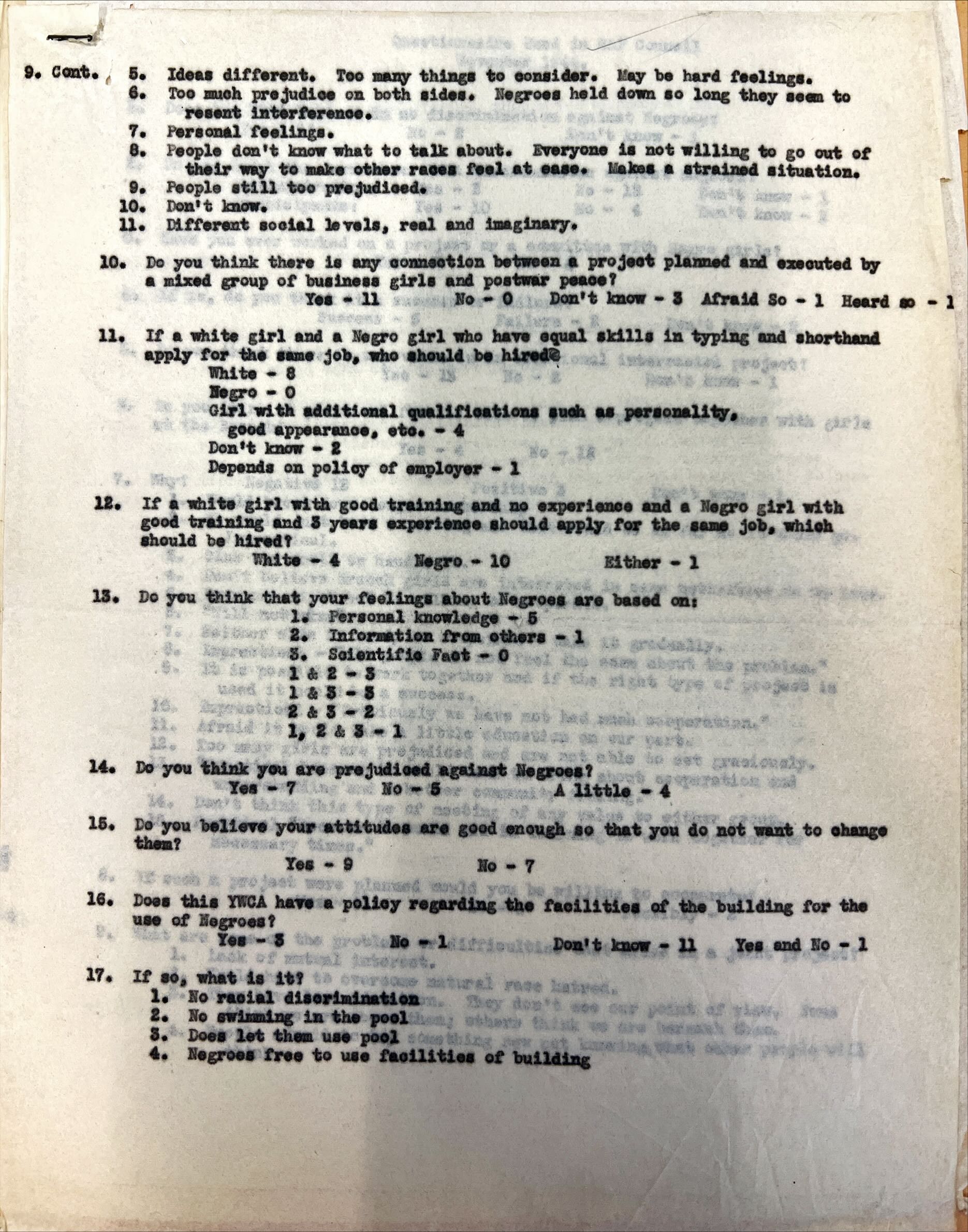Survey on Integration
Katarina Hirschberg Bryn Mawr College Class of 2025 & Grace Diehl Bryn Mawr College Class of 2027
Overview
This questionnaire was used in November 1944 for YWCA administration and “participants”, it is unclear who exactly these participants are, although they are most likely either members of the public or the YWCA. The questionnaire includes various questions about race and integration that shed light on the values and sentiments of the respondents and potentially the community at large. Important to note is the fact that the Interracial Charter that put in place the policy of integration was not adopted until 1946, two years later, so integrated events were yet not required at this time.
Question 2: Do you think the Germantown YWCA discriminates against Negroes?
- Administration: Yes – 2, No – 13, Don’t know – 1
- Participants: Yes – 10, No – 4, Don’t know – 2
The results of this question particularly highlight the discrepancies between the viewpoint of the administration in comparison to the public. Generally, most of the administration said that the YWCA does not discriminate, while most of the participants said that they do. It is clear that the image that the administration is attempting to project does not align with reality. Participants, the ones experiencing the daily proceedings of the YWCA, saw discrimination and reported it as such. The administration, on the other hand, is either unaware of their biases or unaware of the reality. Furthermore, because this was asked before the Interracial Charter was put into place, we can see that the administration was already confident in interracial projects, potentially leading to the early declarations of success with integration and the lack of uplifting Black leaders and voices.
Question 5: Do you think there is any value in an occasional interracial project?
- Yes - 15, No - 2, Don’t know - 1
Question 6: Do you think it practical for the club to plan a project together with girls at the branch?
- Yes - 4, No - 12
These two questions demonstrate the issue of planning versus executing projects. Most participants saw value in interracial projects, generally in favor of their occurrence. However, the same group mostly did not see the projects as practical, for various reasons. In theory, they would be in favor, but in reality, they do not believe that it makes sense to plan these events. It is easy to say that you support something but much more difficult to make the effort for it to happen. Along with that, it would be interesting to ask this question again 2 years from this point when interracial events became policy. With that, more structures were put into place that would make integrated projects more feasible, and potentially it could be more practical.
Question 11: If a white girl and a Negro girl who have equal skills in typing and shorthand apply for the same job, who should be hired?
- White - 8, Negro - 0, Girl with additional qualities (e.g. personality, good appearance, etc.) - 4, Don’t know - 2, Depends on policy of employer - 1
Question 12: If a white girl with good training and no experience and a Negro girl with good training and 3 years experience should apply for the same job, which should be hired?
- White - 4, Negro - 10, Either - 1
These two questions show implicit biases in the community that served to perpetuate discrimination and inequality, but also shows how complicated the issue was. In the first question, it is clear that when given the choice between a Black and white applicant with equal skills, the white one is favored. However, when the Black girl has more experience or a quality that sets them apart, they are considered the better applicant. With that, we can see that the respondents would recognize the skills of an applicant regardless of race, but would still prefer the white girl when there are no outside circumstances.
-
[Questionnaire regarding Integration Page 1, 1944], [Box 24, Folder 27], Young Women’s Christian Association of Philadelphia (Pa.), Germantown Branch Records, Acc. 877, 280, PC-46, PC-89, Special Collections Research Center, Temple University Libraries, Philadelphia, Pennsylvania. ↩
-
[Questionnaire regarding Integration Page 2, 1944], [Box 24, Folder 27], Young Women’s Christian Association of Philadelphia (Pa.), Germantown Branch Records, Acc. 877, 280, PC-46, PC-89, Special Collections Research Center, Temple University Libraries, Philadelphia, Pennsylvania. ↩

